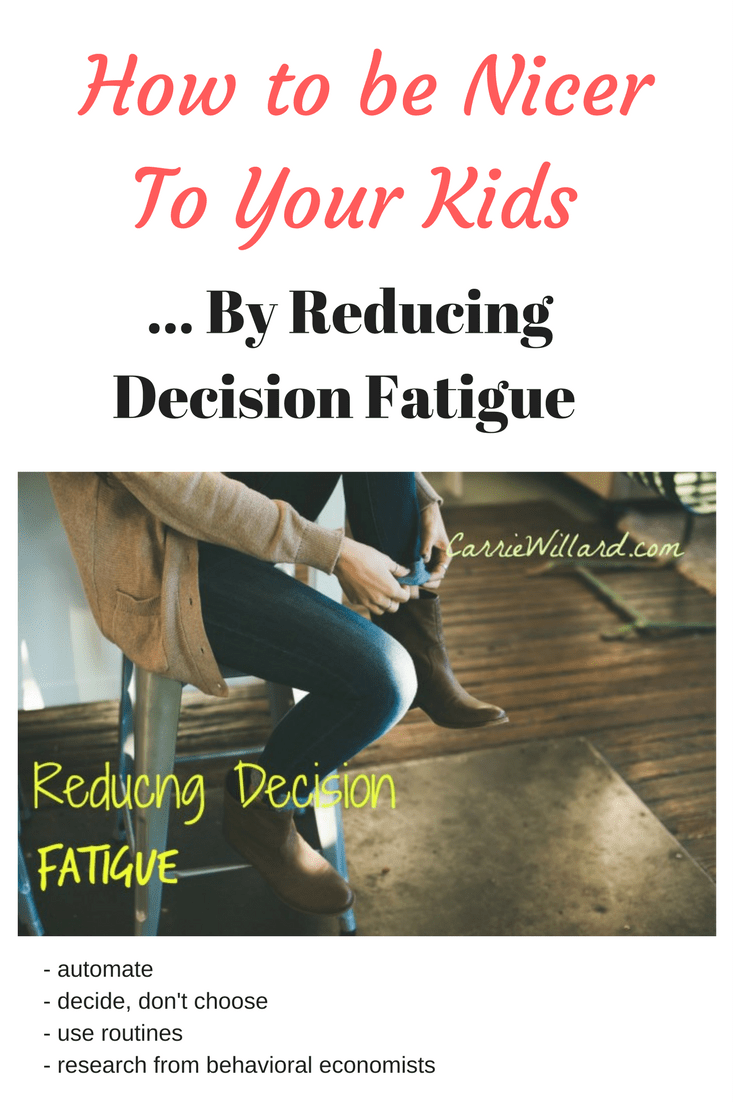Reading the books Willpower and The Paradox of Choice convinced me that too many choices are paralyzing and they deplete our willpower. Reducing decision fatigue is a way of avoiding this problem.
Hence, I’ve actively looked for ways to make fewer decisions in my life. To automate mundane things so I can be more effective in the areas that matter.
(Side note: Now I know why I hate getting a blank tile in Scrabble. Everyone thinks I’m nuts, but I truly dislike that blank tile because having literally ANY choice is stressful to me. It’s much harder to decide on a word when possibilities are endless!)
Reducing Decision Fatigue: How I Minimize Choices
– One of the reasons why I do the bulk of my grocery shopping at ALDI? They only stock about 20% the inventory of other stores. Therefore, I make fewer decisions. After a few weeks of shopping there, one of my older kids noted, “Mom, you’re in a better mood when we shop at ALDI!“.
Grocery shopping used to stress me out. This is another reason I stopped playing the drugstore game and couponing. Too much mental gymnastics with several kids in tow makes me snappy.
(Scientists know that the reason for this is low blood sugar caused by doing math. The brain feeds on pure glucose, so when you’re using your noodle, you can get hangry fast. To replenish willpower, eat a snack! This is why it’s a bad idea to shop on an empty stomach. Low blood sugar = low willpower.)
– On a related note, meal planning helps me avoid making decisions. I divert it into one weekly chore instead of multiple nightly ones. Having a meal plan and grocery list also makes grocery shopping much easier. I only buy what’s on the list!
– Keeping a minimalist wardrobe. It takes me about two seconds to decide what to wear. There’s something so freeing about only having two pairs of pants and four shirts. I’ve set a goal to buy less, but spend more (the latter part is very difficult for me!). I’m inspired by the French women who have tiny wardrobes but who buy the best quality things they can.
– Routines. A morning routine and evening routine is very helpful to me. They eliminate the question “what should I be doing right now?’ This is a point emphasized in the excellent book by minimalist mom Rachel Jonat, Do Less.
A well-laid routine paid major dividends while my preemie was in the NICU. If the stuff ever hits the fan in your life, a routine can save your sanity.
Having a schedule for my workouts (weights on M/W/F, walking or biking every day) eliminates the decision of “do I workout today?” I’ve already decided, ONCE, so don’t need to endlessly debate with myself internally.
I also have a daily and weekly routine for homeschooling that simplifies things.
– Choosing, instead of deciding. This is an interesting distinction Schwartz makes in his book.
Don’t wear yourself out deciding among the many options available. Instead, choose what’s most important to you and then pick the “good enough” thing that meets those parameters.
If you’re shopping for a sofa, for instance, make a list of the features you want (leather, brown, squarish, etc) and then limit yourself to looking and then deciding on those sofas only.
– I limit the need to decide by avoiding places where I will feel overwhelmed by choices.
I’ve never attended a homeschooling convention, because I know it would make me nuts second-guessing my curriculum choices. I don’t have a warehouse club membership even though it may save my large family a little money. I stay out of stores and do most of my shopping for household necessities online, or at small consignment shops.
– Stop looking. Once I’ve made a decision about something, say, homeschool curriculum or a new winter coat, I stop looking and discipline myself not to second-guess my decision. Incidentally, people who do this (“satisficers” versus “maximizers”) are happier. Win/win.
To sum up:
Why would someone want to reduce decision fatigue in their life?

Because willpower is a finite resource and easily depleted. Like a muscle, it can get stronger over time, but is also fatigued quickly.
I would rather use my willpower for things that really matter, and to make good decisions when the stakes are high, rather than use it up on the mundane.
If choosing among 17 kinds of peanut butter depletes willpower but isn’t important in the grand scheme, cut it out.
How do you minimize decision fatigue in your life?
If you’re wondering about the science behind all of this, I recommend Barry Schwartz’s book The Paradox of Choice. It goes into detail about all the studies and research that show how making too many decisions makes you less happy and more stressed.
And if you’re a fan of ALDI (or want to know why people are), check out my ebook! Slash Your Grocery Budget and Eat a Whole Foods Diet with ALDI.
You might also enjoy this article on how to use A.I. to save time and money at home.

Um… YES. So usually when I go to Costco I have my exact list of things I need and I don’t look at anything else. Last week, I needed some appetizers for a gathering and figured I’d just look around and see what looked good. HUGE MISTAKE. My brain completely imploded on me when presented with all the options. I shoved my way back and forth across the warehouse at least 3 times putting things back and getting things I had passed over. Long story short it was ridiculous. And I need to read that book. 😉
Haha! I got a visual of you running around the store pushing a shopping cart breathless. 🙂
Ha! Yes, and I had applied an awful lot of Valor, I was maybe a little aggressive pushing my cart through the crowds, lol. Watch out! Crazy lady coming through! 😉
I couldn’t agree more!! I hate grocery shopping. I quit the coupon game a couple years ago and find shopping a Food Dept saves me time, not necessarily money. Less choices but easier decisions. I hadn’t thought about comparing it to overall shopping before, but it makes sense because I rarely shop department stores. Preferring goodwill and Ross.